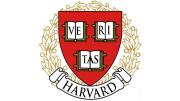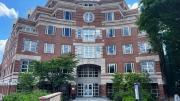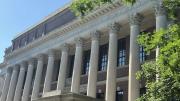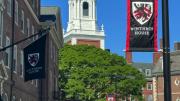Faculty of Arts and Sciences (FAS) dean Claudine Gay today notified Lee professor of economics and professor of education Roland G. Fryer Jr. and the economics department that Fryer has been placed on administrative leave for two years, to be followed by two years of supervised probationary return to academic engagements, as a result of investigations of his “unwelcome sexual conduct toward several individuals, resulting in the creation of a hostile work environment over the course of several years,” within his Education Innovation Laboratory (EdLabs).
Based on the Office of Dispute Resolution investigation of allegations made against Fryer, who joined the faculty as an assistant professor in 2006 after three years as a Junior Fellow within the Society of Fellows, it was determined that he had engaged in unwelcome conduct toward staff members in his research organization. [Updated July 24, 2019, at 1:35 p.m., to remove the prior characterization, “Although the behaviors do not constitute sexual harassment….” Per Dean Gay’s message below, “The Office for Dispute Resolution (ODR) recently completed a thorough and careful review of formal allegations made against Professor Fryer, and concluded that he engaged in unwelcome sexual conduct toward several individuals, resulting in the creation of a hostile work environment over the course of several years. The ODR review also documented behavior that was not sexual harassment but that constituted violations of the FAS Professional Conduct Policy.”] Other behaviors have been deemed violations of FAS’s standards for professional conduct within Harvard. Accordingly, Gay has placed him on administrative leave for two years, meaning that:
- he cannot teach or advise within FAS during that period;
- he cannot conduct research involving Harvard resources during that period; and
- the EdLab is closed.
For the two years following the period of leave, Fryer may return to academic work (but not to a supervisory role) subject to the conditions that:
- his undergraduate teaching is at the dean’s discretion and subject to monitoring by a Title IX-trained individual, and will not involve any graduate teaching fellows; and
- his graduate teaching is limited to a class format, excluding workshops.
At the end of that two-year, supervised probationary period, Gay will assess whether Fryer may be reinstated to regular academic privileges.
No mention was made about whether Fryer’s tenured status is changed as a result of the sanctions announced today or during the period of his leave or probation. Typically, during an administrative leave, salary is not paid, and benefits are billed to the beneficiary, who maintains them by paying the bills. (Fryer’s status within the Graduate School of Education is separate from his standing within FAS; check back for further information. Updated July 11, 2019, 1:25 p.m.: HGSE dean Bridget Terry Long issued a statement today. It reads: “Upon review of the conclusions reached by ODR, I decided that the sanctions determined by Dean Gay are also appropriate and necessary to apply to Professor Fryer’s partial appointment at HGSE. HGSE remains deeply committed to respect, tolerance, and safety in our learning and working community.”)
The case has attracted enormous attention because Fryer is a widely recognized, accomplished economics researcher (he is both a MacArthur Fellow and a John Bates Clark Medalist—the honor conferred by the American Economic Association on the best American economist under age 40); he is a prominent African American in a discipline that has struggled to become more diverse; and his case, normally conducted confidentially, has leaked and been reported on extensively in The Harvard Crimson, The New York Times, and elsewhere (in an extended critique of Harvard’s investigation and news coverage of Fryer). According to some of those prior reports, Fryer was prohibited from entering his lab during at least part of the protracted investigations of his conduct.
Locally, Gay’s decision comes at a time of heightened attention to sexual assault and harassment, and in the wake of the determination last May that long-time professor Jorge Domínguez would be stripped of his emeritus status, and effectively banned from the community, following “unwelcome sexual conduct toward several individuals, on multiple occasions over a period spanning nearly four decades.”
Although the sanctions imposed on Fryer are significant, he is not being dismissed outright nor, so far as is known, stripped of his tenure, at least to date. Gay’s determinations may have been shaped by the duration of the documented unwelcome behavior, its severity, and other considerations that distinguish the facts in this case from those that governed in Domínguez’s.
In circumstances like these, where behavior is deemed unwelcome, in ways that create an environment not conducive to professional conduct, but not found to be impermissible sexual assault or harassment, issues of permissible speech and freedom within the academic community often come into play. FAS’s free speech guidelines recognize the challenges this way:
Free speech is uniquely important to the University because we are a community committed to reason and rational discourse. Free interchange of ideas is vital for our primary function of discovering and disseminating ideas through research, teaching, and learning. Curtailment of free speech undercuts the intellectual freedom that defines our purpose. It also deprives some individuals of the right to express unpopular views and others of the right to listen to unpopular views.…
Speech is privileged in the University community. We are equally committed to the individual’s pursuit of inquiry and education. There are obligations of civility and respect for others that underlie rational discourse. Racial, sexual, and intense personal harassment not only show grave disrespect for the dignity of others, but also prevent rational discourse.
Gay’s decision, in light of the investigation of the allegations arising from Fryer’s speech and conduct within his laboratory, gives some operational meaning to the definition of those principles at Harvard today.
Dean Gay’s statement follows:
Dear Members of the Economics Department,
I am writing to inform you of upcoming changes within the Department of Economics that will occur as a result of disciplinary actions being taken regarding Roland Fryer, Jr., Professor of Economics and Founding Director of the Education Innovation Laboratory (EdLabs). As these changes directly impact the members of the Economics Department, I describe them here, as well as the findings that motivated them.The Office for Dispute Resolution (ODR) recently completed a thorough and careful review of formal allegations made against Professor Fryer, and concluded that he engaged in unwelcome sexual conduct toward several individuals, resulting in the creation of a hostile work environment over the course of several years. The ODR review also documented behavior that was not sexual harassment but that constituted violations of the FAS Professional Conduct Policy. In short, Professor Fryer exhibited a pattern of behavior that failed to meet expectations of conduct within our community and was harmful to the well-being of its members. I was particularly upset to learn of the ways in which EdLabs members have been impacted, both personally and professionally. The totality of these behaviors is a clear violation of institutional norms and a betrayal of the trust of the FAS community.
In my role as FAS Dean, I have determined that sanctions for Professor Fryer will include the following measures:
- Professor Fryer will be placed on administrative leave for two years, and while on leave will not teach or advise in the Faculty of Arts and Sciences, nor conduct research involving Harvard resources.
- The EdLabs will be closed.
- For the first two years after he returns from leave, Professor Fryer will not have advising or supervisory roles at Harvard, and will, at my sole discretion, be allowed to teach undergraduate classes subject to monitoring by a Title IX-trained individual, and without access to graduate Teaching Fellows.
- He will be allowed to teach graduate classes but not graduate workshops.
- At the end of those two years, I will decide whether to restore some or all of these privileges.
While these sanctions are an appropriate response to the documented behaviors, they unfortunately result in the loss of the important work of the EdLabs. I know that I speak for the Department when I say that research to inform policy decisions that combat educational inequality has never been more urgently needed. We remain committed to this mission and will continue to find ways to support this important work.
I remind all members of our community that if you witness or experience sexual or gender-based harassment, there are many resources available, including the FAS Title IX Coordinators, the University Title IX Office, the Office of Sexual Assault Prevention and Response, Harvard University Counseling and Mental Health Services, the Harvard Chaplains, and the Employee Assistance Program. These offices, as well as the FAS Office for Faculty Affairs, can connect you with resources to address the full spectrum of professional conduct issues.
Sincerely yours,
Claudine Gay
Edgerley Family Dean of the Faculty of Arts and Sciences








